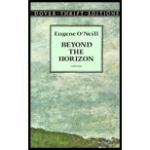|
This section contains 3,386 words (approx. 9 pages at 400 words per page) |

|
In the following essay, Black compares Beyond the Horizon to plays by Sophocles and Euripides in arguing that it is "the first play by an American that can justly be called a tragedy."
Beyond the Horizon (1918), Eugene O'Neill's first successful long play, does not hold a very prominent place in the O'Neill canon. It deserves better. Although an obviously early work, it is the first play by an American that can justly be called a tragedy. O'Neill would not consistently reach tragic levels so high until the late 1930s. I will try to defend this large claim by drawing analogies between the meanings of the play and the tragic vision I construe in O'Neill's ancient companions, Sophocles and Euripides.
Like the Attic Greeks, O'Neill is preoccupied with the discoveries people continually make of their mortality, impotence, and unimportance, of the difference between the powers they believe themselves...
|
This section contains 3,386 words (approx. 9 pages at 400 words per page) |

|




